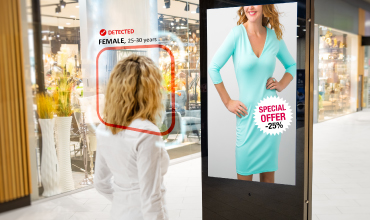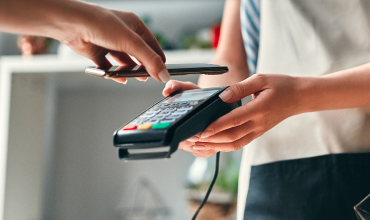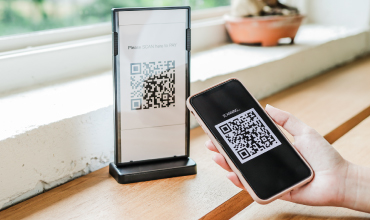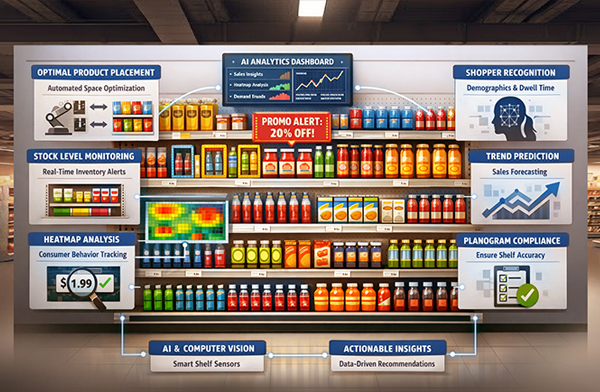Discover how artificial intelligence is revolutionizing retail through hyper-personalization and automation, enhancing Customer 360 strategies, streamlining supply chain optimization, and driving revenue growth as part of broader retail digital transformation efforts.

Imagine entering a store where tailored recommendations appear on your phone in real time, the checkout is invisible, and the shelves intuitively know what you need.

Or imagine browsing an e-commerce website where artificial intelligence understands your preferences so precisely that every item displayed seems chosen just for you.
This isn’t a distant future—it’s happening right now.
Brands are using artificial intelligence to create frictionless shopping experiences, optimize inventory management, and understand consumer behavior at a granular level.

A 2024 Gartner report found that 91% of retail CIOs prioritize AI as a key investment area by 2026.

Meanwhile, Retail Dive reports that AI-powered retail sales are projected to reach $200 billion annually.
Companies that overlook AI risk are falling behind as they reshape supply chains, customer engagement, and in-store operations.
Personalization at Scale:
AI’s Impact on Customer Engagement
Modern consumers demand customized experiences. Data from many sources is consolidated by AI-powered Customer 360 (C360) systems, enabling brands to better grasp buying patterns, preferences, and intent.

According to a Forrester study, personalization driven by artificial intelligence raises engagement by 25% and boosts conversions.
Using real-time data analysis, artificial intelligence is helping retailers create tailored recommendations across both digital and physical media. This extends beyond recommendations for products; artificial intelligence maximizes loyalty programs, targeted advertising, and pricing.
AI in Associate Collaboration, PoS, and Phygital Marketing
AI-Driven Associate-to-Associate Personalization

AI is reshaping retail operations by providing real-time insights that help retailers predict demand, automate pricing, and manage inventory more effectively. These capabilities reduce errors, enhance efficiency, and support smarter decision-making across store functions.
The Spring Fair report highlights that AI improves supply chain operations through real-time product tracking, demand forecasting, and optimized stock levels, enabling retailers to deliver better customer experiences faster and more accurately. Retailers that implement AI in associate collaboration report faster decision-making, improved customer satisfaction, and reduced inventory errors.
AI-Powered Point-of-Sale (PoS) Enhancements

Point-of-sale (PoS) systems are no longer merely transaction points—they have evolved into intelligent customer engagement hubs. AI-powered PoS solutions analyze transactions to recommend upsells, adjust pricing based on demand, and automate inventory replenishment.
AI-enhanced PoS systems personalize customer interactions at checkout, providing contextual upselling suggestions based on past purchases and real-time behavior. Major retailers like Target now use AI-driven PoS systems that process up to 360,000 inventory transactions per second, ensuring real-time inventory accuracy.
Phygital Marketing & AI-Powered Coupons

Phygital marketing bridges the gap between physical and digital shopping experiences by delivering AI-powered, personalized promotions in real-time. Unlike traditional printed coupons, AI-driven phygital coupons use NFC tags and QR codes, offering targeted discounts based on in-store browsing behavior.
According to Shopify’s 2024 AI in Retail report, retailers implementing AI-driven coupon strategies report 34% higher redemption rates than digital-only campaigns. Sephora’s AR-powered virtual try-on technology helped drive a 35% increase in skincare sales, showcasing how immersive digital experiences can boost customer engagement and purchasing confidence.
Frictionless Checkout & Smart Stores

AI is redefining physical retail spaces, creating cashier-less stores and automating in-store operations. Retail Dive forecasts that 70% of routine store tasks will be automated by 2025, including checkout, inventory tracking, and customer service.
Retailers are using smart shelves driven by artificial intelligence, computer vision for loss prevention, and automated checkout systems modeled after Amazon’s Just Walk Out. These innovations reduce waiting times, prevent shrinkage, and improve store efficiency.
Conversational AI: Enhancing Customer Service & Sales

AI-powered chatbots and virtual assistants are bringing a paradigm shift to consumer interactions. Retail Dive claims that 31% of shoppers now use AI-powered assistants to make purchase decisions, and AI chatbots handle most pre-purchase queries. Conversational AI enhances customer engagement while lowering operational costs.
Why AI in Retail is No Longer a ‘Nice to Have’
Artificial Intelligence (AI) in retail is no longer a tool — it has transformed into a key driver of revenue growth, efficiency, and customer loyalty. From improving user engagement rates to reducing operational expenses, businesses implementing AI are already getting rewarded. Challenges remain, including data integration, workforce training, and the need for robust AI governance.
This is where HTC Retail & CPG Offerings come in. A pioneer in tech solutions, HTC offers:
- AI-powered Customer 360 solutions for data-driven personalization.
- Predictive analytics & automation tools for supply chain optimization.
- AI-driven marketing & customer engagement strategies to improve customer lifetime value.
- End-to-end AI consulting & deployment to ensure seamless transformation.
Retailers looking to future-proof their operations must act now. Explore how HTCNXT AI solutions can help accelerate digital transformation.






